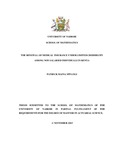| dc.description.abstract | There is need to have a healthy nation which can be achieved by accessing quality medical
care which is dear to attain. In order to increase the chances of achieving the quality medical
care both salaried and non-salaried should be sensitised on the need to take up the policy.
Through, the foregoing the study sought to investigate risk preferences, risk attitudes and
demand of medical insurance among non-salaried individuals in Kenya. Specifically we
sought to find out the determinants of medical insurance cover among non-salaried
individuals and to determine the chances of renewing medical insurance cover among nonsalaried
individuals in Kenya. To achieve our objectives, we adopted Holt and Laury method
to measure risk preferences and probit regression analysis to determine the renewal of
medical insurance under limited credibility. Secondary data was collected from Mountain
View Welfare Association group members who had taken up medical insurance cover.
Results of the study showed an inverse significant relationship between renewal premium
increased by twenty percent and renewal of medical insurance cover, an increase of renewal
premium by ten percent had a positive significant influence on renewal of medical cover. In
addition, there was a positive significant relationship between peer influence and renewal of
medical insurance. There was a negative significant relationship between low credibility and
renewal of medical insurance policy while relative risk had a positive significant relationship.
Insurance should develop products customised to fit the unique needs of non-salaried
individuals as such to increase the chances of more members taking up the insurance policy.
There is need to market and penetrate insurance services through peer influence as well as on
study circles. Since majority of the non-salaried individuals renewing the cover were male,
household heads below 64 years measures such as product differentiation should be taken as
such to increase insurance penetration within individuals with such demographic
characteristics. To increase credibility among the group member’s insurance companies
should share the success stories after indemnification among the insured members. | en_US |

